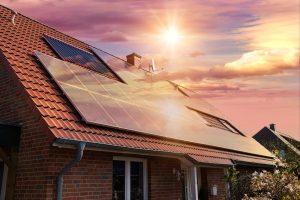Why Solar?

As the world continues to grapple with pollution’s effects, solar energy has emerged as a top contender for its cleanest and most reliable power source. Experts expect to see a 40% increase in solar installations between 2023 and 2027.
From homes to businesses, this sun-powered solution holds plentiful promise in our transition away from fossil fuels – but is it worth investing your own money?
Start exploring if making the switch to solar would be beneficial! We’ve put together a few main advantages of solar power below:
Renewable Resource
Solar energy is a brilliant source of renewable, clean power. It doesn’t deplete resources and it emits zero carbon footprint – all while decreasing the environmental impact caused by fossil fuel production. Plus, this alternative resource uses almost no water compared to traditional electricity plants.
Decrease Electric Bill
With power prices on the climb, savvy consumers are turning to solar energy to provide an alternative or supplement for powering their homes. By making this switch and harnessing solar energy, households can expect significant savings each month!
Increased Home Value
Investing in solar energy is the perfect way to add value and appeal to your home. Not only will you reap savings on utility bills, but studies have shown that homes with a solar system can fetch higher prices than those without when it comes time for sale.
According to studies from the National Renewable Energy Laboratory, every dollar a solar panel saves you on your electric bills increases the value of your home by $20. In addition, homes with solar panels installed sell for four percent higher than those without.
Available Everywhere
Solar opportunities don’t discriminate based on location. While some areas are more fit for solar than others, even places with relatively low solar resources can experience cost savings. This energy is available for use every single day of the year, and even cloudy days are capable of producing some power.
Earn Tax Credits and Rebates
Based on the federal income tax credit, homeowners will get 30 percent of total system costs back from equipment and installation when filing taxes. Combine this with state and local rebates and Solar Renewable Energy Credits (SRECs), and cost can be greatly reduced.
Regardless of where you live, it’s likely you have some amazing solar incentives in place. Learn more about what is available to you and take advantage of these benefits while you can.
Low-Maintenance
Installing a solar system is an investment in future cost savings, as routine maintenance typically only involves keeping the panels free of debris. With minimal effort and no need for costly upkeep, consumers can enjoy reliable energy production with virtually no upkeep.
Power Prices on the Rise
For the past decade, electricity prices have been soaring and don’t seem to be coming back down anytime soon. But with solar power consumers can combat rising bills. In fact, some are able to even make a profit by selling extra unused energy back to the utility company.
Expect a Long Lifespan from Equipment
With solar panels, your energy savings will continue to add up over time. The good news is that most residential solar panels should operate for 25 years before degradation (or reduced energy production) is noticeable. Even at this benchmark, solar panels can still continue to convert sunlight into energy – just less efficiently than when they were originally installed.
It’s also important to note that most manufacturers offer short warranties for solar equipment. This can be crucial in the event of extreme weather, fallen branches, etc.
Continued Improvements
From the simple beginnings of harnessing energy from the sun, solar power technology has advanced dramatically. Its increased availability and decreased cost have meant that more people than ever can now experience the advantages of this inexhaustible source of energy. Solar technology is becoming more advanced and efficient, and even the aesthetics are improving day by day.
Solar energy is an incredible way to both save money and help our planet. Over the course of several years, investing in a solar system can ultimately lead to big electricity savings for consumers – go through the considerations mentioned above so that you can make an informed decision for your home!
FAQs:
Do solar panels work on cloudy days?
It depends on the day, but generally solar panels work at 10 to 25% efficiency on cloudy days.
What are the best roof conditions for solar?
The most ideal roof to install solar is a roof in new or good condition (based on the estimate the panels will last about 25 years), that does not have any obstructions that cause shade. Ideally, the roof would have no more than a 30-degree angle.
Do solar panels work in a blackout?
If your solar panels are connected to the grid, they will shut off in the event of a power outage. However, there are certain inverters you can buy that provide backup power throughout a blackout when paired with a battery

Anna has over six years of experience in the home services and journalism industries and serves as the Content Manager at MyHomePros.com, specializing in making complex home improvement topics like HVAC, roofing, and plumbing accessible to all. With a bachelor’s degree in journalism from Auburn University, she excels in crafting localized, comprehensive guides that cater to homeowners’ unique needs. Living on both coasts of the United States has equipped her with a distinctive perspective, fueling her passion for turning any house into a cherished home through informed, personalized decision-making.
